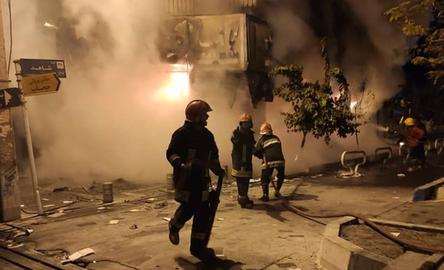Using the neutral word “death” when talking about someone who has been honored as a “martyr” can get journalists into big trouble, writes Pouyan Khoshhal, who has been through the experience himself.
In Iran, the words “martyrdom” and “martyr” are forever tied to the death of Shia Imams, or of soldiers and commanders of the Iran-Iraq war, the celebrated people who die defending shrines, and sometimes the death of military and law enforcement personnel killed during internal operations.
At the same time, especially over the last decade, as ideological sensitivities have grown and dominated the mood of the country, the actions of the so-called religious hardliner groups referred to as Arzeshi [“value-abiding”] have helped to impose more restrictions on the media. And the way “martyr” is used is definitely part of their lexicon.
When reporting on the killing of a Basiji in the Tehran-Pars neighborhood on October 20, Hamshahri newspaper published the following headline: "Death of a Basij man in clashes with miscreants.” It prompted protests and criticism against the publication, including from professors belonging to the Basij Organization of Tehran Azad University, some prominent personalities, and many people on social media. For them, the use of the word "death" for a person who had been described by the pro-government media as a "martyr for enjoining good and prohibiting vice” was an offense.
"When I saw the dramatic headline for Hamshahri newspaper, I was shocked and wondered whether the headline was a Zionist newspaper or an Iranian newspaper," said Abdolhossein Khosropanah, a cleric close to Iran’s Supreme Leader Ayatollah Khamenei.
Khosropanah continued: "Oh God, to whom should we complain that the official newspaper in a state institution run by the people's money calls the martyrdom of a young brave person and a defender of the people's honor and a martyr for security a 'death'?”
The cleric even issued an apology to the slain Basij, a gesture that would have been expected from the Ministry of Guidance and the Tehran Municipality.
Looking at the statement issued by the Basij of Tehran Azad University professors, it is easy to see what limitations the media face with regard to this particular topic. The professors not only condemned the use of the word "death" instead of “martyrdom," they went on to call for the security and judiciary institutions to investigate and "punish the perpetrators."
In fact, this tactic has weaved its way into the judicial system in recent years, and has become known as “case-making.” On October 24, 2018, when I was the editor of the social page of Ebtekar newspaper, I was arrested by Revolutionary Guards security agents for using the word "deceased" instead of "martyred."
An article published by judiciary news agency Mizan on that day cites "reports from public sources and judicial officers" as the reason for my prosecution: exactly what the professors at the Basij Organization of Tehran Azad University have demanded in this most recent case.
Can it Really be a Crime to use the Wrong Word?
A look at the history of how words have been used to report on deaths in the Islamic Republic reveals a gradual move toward restriction, and toward a ban on neutral terminology. When it comes to a process of “sanctification” for certain people’s deaths, journalists have been pressured to use words approved by the government or clerical authorities.
But can it really be a crime for people to use words like death, dying, deceased, killed and so on?
Lawyer Musa Barzin Khalifehlou says this ban on words cannot be held up under the laws of the Islamic Republic, at least not by terming it as a “crime.” However, it can be considered an “insult," and this can be the subject of a lawsuit against a journalist or the media outlet for which he or she works.
"Insulting religious shrines and religious figures — imams — is mentioned in both the press law and the Islamic penal code," the lawyer told Journalism Is Not A Crime, IranWire’s affiliate site. "If such an insult appears in the media, in addition to [a case against the] journalist, a separate case will be filed against the media agency, which can even lead to the seizure and closure of the business. But to say that it is an insult if a journalist uses words such as death and deceased, and so on... there is no such thing in the law."
According to Barzin Khalifehlou, if a case is brought against someone because of an insult, the insult must be explicit, such as use of an obscenity. It is up to the court to determine whether a journalist has been insulting in an article or not. "The court will study the insult. It must also look at whether the word or phrase used is considered to be swearing according to society’s customs or not. When someone is killed, and we say he was killed, is not an insult, because such a thing is not considered to be an act of swearing according to custom; the law refers specifically to swearing as an insult. For example, if it is said somewhere that Islam is violent, such a thing is not considered an insult and no crime has been committed.”
It’s obvious that the treatment of journalists for these alleged offenses is a political and ideological issue and not a legal one, he says. "For example, if you say or write that one of the Shia imams was killed, this is a fact and the general public believes it. As a result, social custom says he was killed, so this is not a crime, because there is no insult to the sanctities and no insult to religious figures. Even when a person uses a word that sounds like an insult, if the court suspects it is not and there is any doubt, it should not be considered as an insult and therefore no crime has been committed."
Intimidation by Islamic “value-abiding” groups on social media and at gatherings, attacks by Basijis outside newspaper offices, arrests by judicial officers, and, ultimately, heavy sentences handed down by the judiciary have prompted journalists, editors-in-chief, and editors to pay special attention to “the news of death."
The security environment for such incidents has expanded to such an extent in recent years that an arrest warrant can be issued for the slightest comment by a media outlet regarding a death.
10 Years for the Wrong Word
In January 2019, following the assassination of Ghasem Soleimani, the Khabar Online Telegram channel used the word “death” in a report, prompting a strong response from religious extremists on social media.
Following the publication of the story, the managing director of the news agency was prosecuted, although an hour later he issued an official apology on the website. But sometimes an apology is not enough, and, to create an atmosphere of repression and fear in the media, authorities will often force people to face prosecution even if they apologize.
In 2018, when he was working for Jahan-e Sanat newspaper, journalist Amir Hossein Miresmaeili attracted widespread criticism online after posting a tweet that judicial authorities said was an "insult to the eighth Shia Imam.” He was arrested, part of a crackdown at the time. Unlike some others arrested on this charge, his apology on Twitter was not accepted. Miresmaeli was eventually sentenced to 10 years in prison and smuggled out of Iran across land borders before his court of appeals trial was held.
In another case, in 2015, the editor-in-chief of the newspaper Rouyesh Mellat was convicted of using the phrase "killed" when referring to the death of Hossein Hamedani, a Revolutionary Guards official.
And, on October 23, 2013, the judiciary called an article entitled "Imam; A political leader or a belief role model?” published in Bahar newspaper insulting. The article, which was published on the eve of Eid al-Ghadir, was accused of creating "doubt about the velayat of Imam Ali,” or essentially calling into question the founding principles of the Islamic Republic, which gives ultimate authority to the Supreme Leader.
The government clearly seeks to use cases such as the killing of Ghasem Soleimani or the Basij man in the Tehran-Pars neighborhood, demanding sanctification, and if it feels the media inadvertently or intentionally intends to defame or insult the regime or the person who has behaved according to its rules, the journalist or outlet will encounter an immediate crackdown. In these cases, extremists use terms such as “insulting," “sludge-spreading" and “slander" to refer to the alleged offense.
It should be noted that according to the provisions of Article 6 of the press law, "insult to the religion of Islam and its sanctities" as well as "insult to the Supreme Leader and the sources of emulation,” "defamation of officials and institutions," and "insulting natural and legal persons who have religious sanctity, even by the publication of photographs or cartoons," are prohibited.
Many newspapers have been banned in the last decade based on these prohibitions, and their editorial staff and managers have been summoned or arrested. In one example, in February 2014, the Aseman newspaper was banned because it called the qisas [retribution] sentence enshrined in Islamic law inhumane.
visit the accountability section
In this section of Iran Wire, you can contact the officials and launch your campaign for various problems

























comments